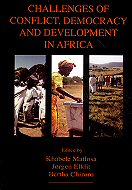|
Challenges of Conflict, Democracy, and Development in Africa
|
Edited by Khabele Matolsa,
Jorgen Elklit, Bertha Chiroro
|

|

The debate on the interface between democracy and development is an old one, yet it has still not been resolved in either academic or policy discourse, especially in the African context. Posed simply, the debate has revolved around whether or not democracy promotes development or, conversely, whether or not socio-economic development produces an environment that allows democracy to thrive and be sustained in the longer term.
One school of thought holds that there may not necessarily be a causal link between democracy and development as such, especially in light of the experiences of the East Asian newly industrializing countries, also referred to as the East Asian Tigers, which experienced accelerated economic growth while at the same time labouring under extreme forms of authoritarianism. The irony in Africa is that the immediate aftermath of political independence in many countries also ushered in authoritarian forms of governance, yet unlike East Asia, African authoritarianism did not trigger economic growth. Instead it has been marked by underdevelopment, poverty, disease, joblessness, and lack of housing and other basic amenities. Such differences indicate that any causal linkages between democracy and development are context specific.
It is here that this volume contributes to filling a critical lacuna in academic and policy discourse in Africa today. Emanating from the first EISA annual symposium held in November 2006, the book tackles a number of topics around this subject. In the process, it revisits the interface between democracy and development, as well as linking it to the discourse on peace and security.
The main argument is that if democracy is to be both socially relevant and responsive, it should encourage socio-economic development and such development ought to lay down a structural configuration of power and distribution of resources that is conducive to sustainable democracy. In the final analysis, both democracy and development have to promote political stability, peace, and harmony.
|
|
